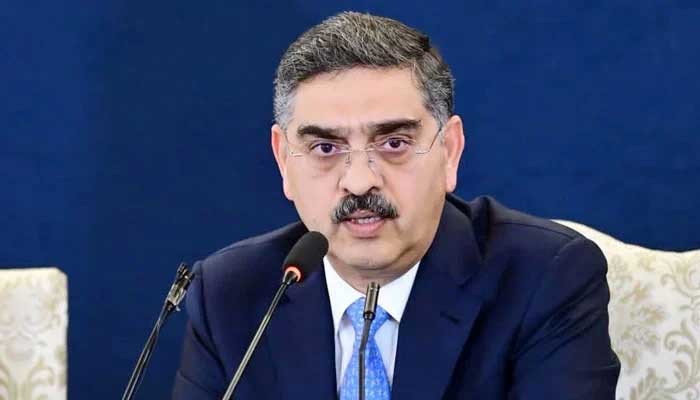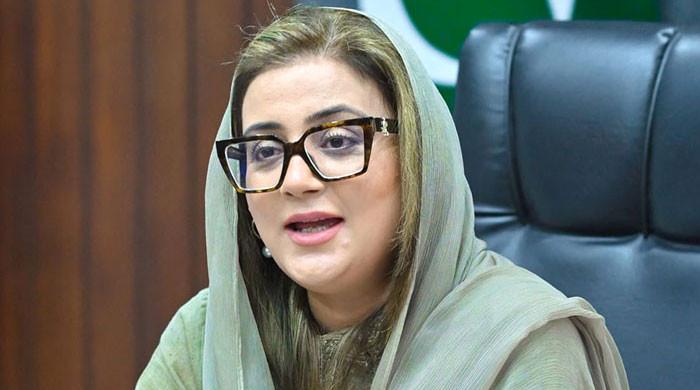Task force to determine sizes of federal, provincial govts: PM
PM Kakar says SIFC attempting to address reasons for ill-governance in the past
September 11, 2023

- "We are convinced that there is a need to rationalise expenditure," says PM.
- Kakar says army boosted level of confidence of civil service.
- Govt planning for Saudi crown prince's visit to exploit economic oppurtunities.
Prime Minister Anwaar-ul-Haq Kakar Sunday said a task force headed by the finance minister would determine the sizes of federal and provincial governments, look at options to better manage pension funds, besides making efforts to rationalise public expenditure and increase revenue.
“We are convinced that there is a need to rationalise expenditure and increase the revenue of the government to create a viable state and lessen existential threats due to economic vulnerability,” the premier said in an interview with a local TV channel on Sunday.
He said the Special Investment Facilitation Council (SIFC) was attempting to help achieve appropriate governance and address the reasons for ill governance in the past.
The civil institutions were lax in their working in the past but now the army leadership with its organisational strength had increased the level of confidence of civil service which had renewed energy to implement policies and achieve goals, he added.
The prime minister said the government was optimistic about investment from Saudi Arabia in the backdrop of talks between Saudi Crown Prince Mohammad Bin Salman and Pakistan’s chief of army staff. The government was planning for a visit of Saudi dignitary, adding the visit would be aimed at fully exploiting economic opportunities in the country.
The prime minister informed that a Pakistani consortium of oil companies and Saudi oil company Aramco were in business talks for setting up an oil refinery in Pakistan. The United Arab Emirates had also shown keen interest in the exploration of minerals in Pakistan, he mentioned.
Kakar said while citing skewed reasons for the lack of industry and agriculture in Balochistan, in the past a lenient approach was adopted towards the issue of smuggling which adversely affected the economy and the goods meant for border areas went to inner parts of the country. Smuggling from border areas affected import policies and the economic management, he remarked.
He said the current military leadership and caretaker government had a clear viewpoint that the movement of people and goods at the borders of Iran and Afghanistan should be regulated.
The prime minister said now due to the clarity of thought of the political and military leadership, the personnel of law enforcement agencies knew that borders were sacrosanct and this had led to successful efforts to stem the flow of smuggled goods.
'Foreign policy driven by geoeconomics'
To a question, he said in the post-Cold War scenario, the government was observing the geostrategic situation in the region and international arena, in relation to the vital interests of Pakistan.
Now Pakistan’s foreign policy was driven by geoeconomics along with its core strategic goals, he noted.
To another question, he said the work of SIFC was focused on particular sectors of the economy including agriculture and the council was dealing with issues of per hectare water conservation, technology transfer, quality seed and job creation.
He agreed that there was an information vacuum on the issues taken up by SIFC and said the government was coming up with a plan to keep the public informed and create awareness about taxation culture, economic initiatives and strategic issues. Relaying of information would kill rumours on its own, he remarked.
He said the caretaker government would the make right decisions instead of resorting to populism and would try to lay a foundation for the next government.
Replying to a query, he said after the 18th constitutional amendment, the incumbent president would continue in the office till his successor would replace him.
Under the prevailing law, constitution and legislation done by political parties, the Election Commission as a constitutional body would announce the date for elections, he said adding general election should be held before March so Senate elections could be held to fill the seats made vacant by retiring Senators.
To a question about any leniency for the perpetrators of the May 9 incident, he said political, social and economic stability were linked to the sense of justice and did not revolve around the concept of amnesty. Vandalism and arson could not be accepted as a norm, he continued.
He said the chequered political history of the country could not be made a basis for the claim for clemency as this approach was detrimental to the growth of democracy.
“Let us have an open debate on state institutions, nation-building and strengthening of democracy. However, we cannot reward bad behaviour with amnesty.”
While talking about his upcoming visit to the United Nations General Assembly in New York, he said it was decided that Pakistan should be represented at the highest level as it was a forum to articulate and reiterate Pakistan’s position on issues of strategic importance.











